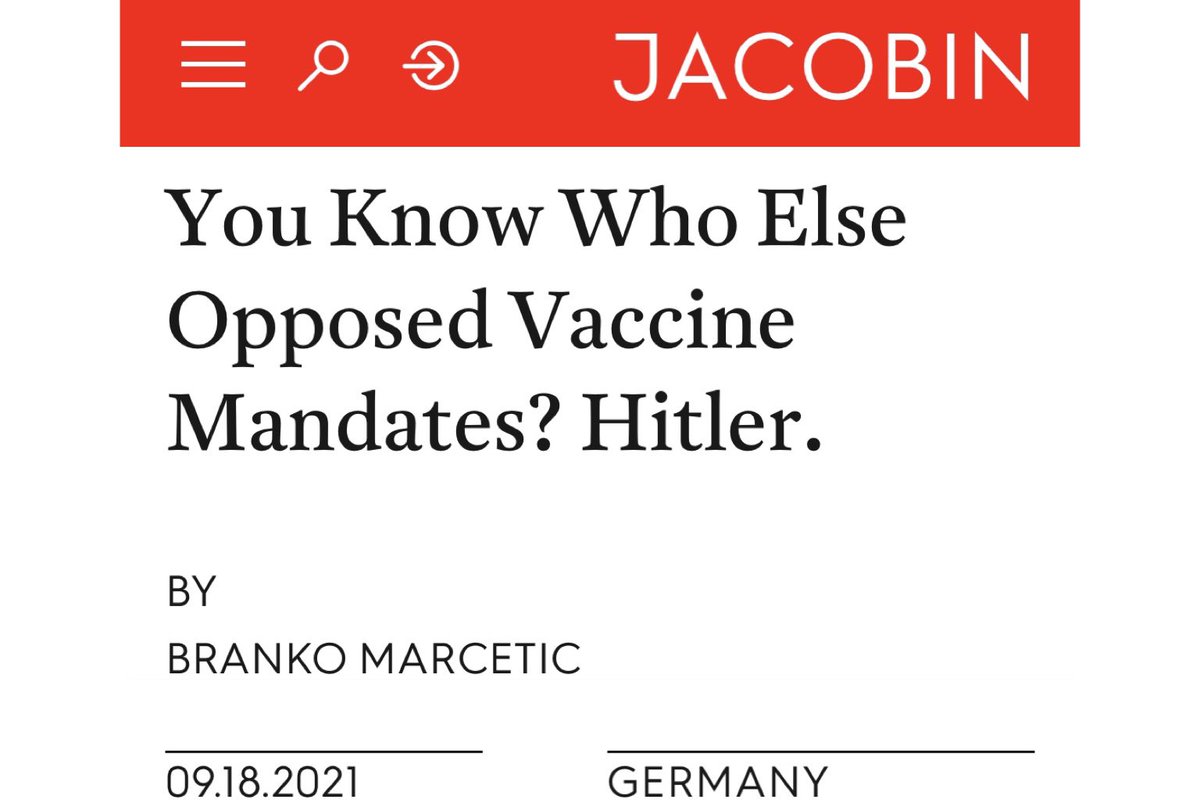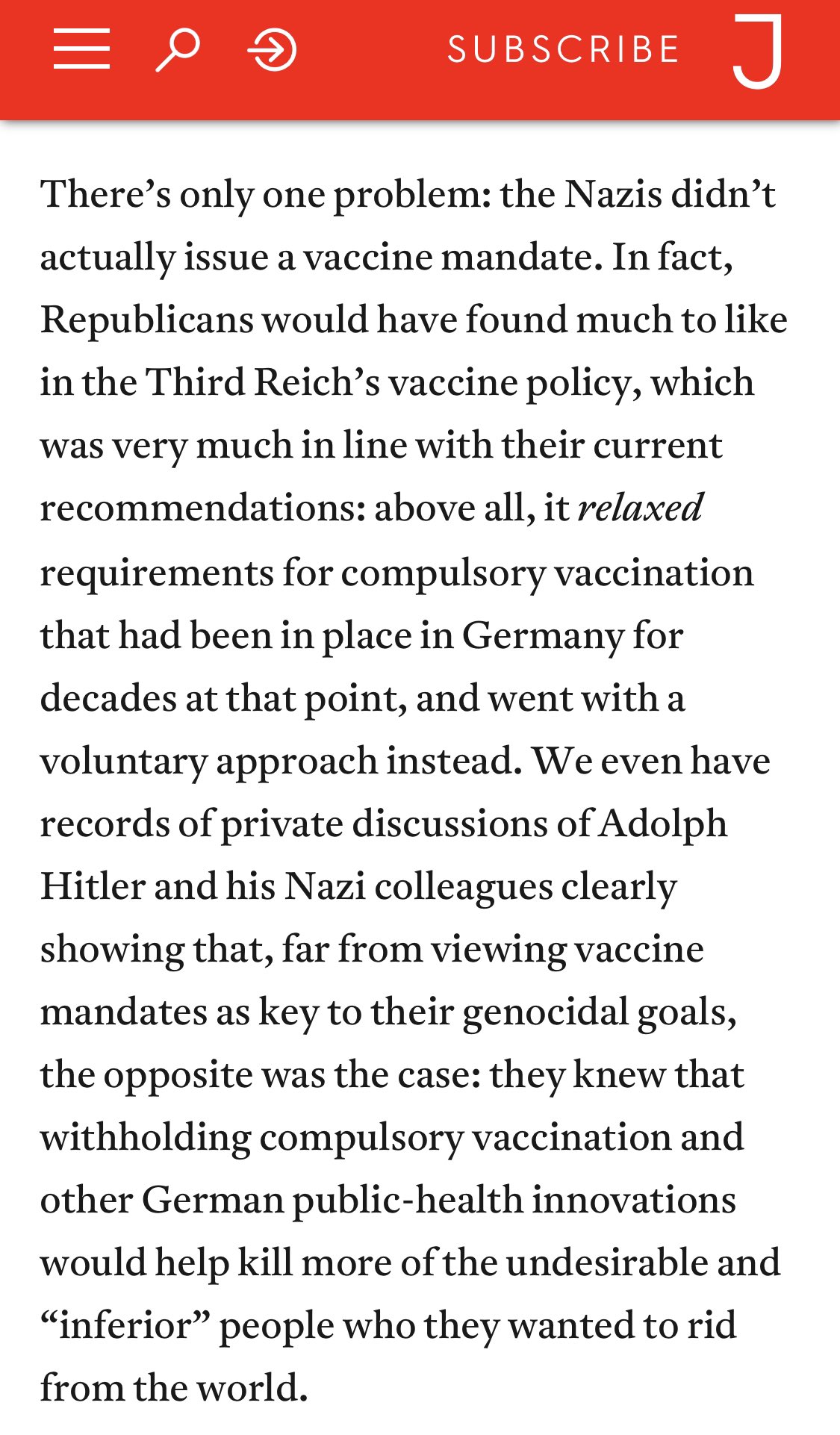You Know Who Else Opposed Vaccine Mandates? Hitler.
By Branko Marcetic
Contrary to claims about “fascist” vaccine mandates currently circulating on the Right, the Nazis actually relaxed German vaccine mandates — and hoped doing the same for people they conquered would kill them faster.
Pop quiz: What allowed the Nazis to seize and hold on to autocratic power in Germany for more than a decade, and carry out the horrific crimes they’re known for? Was it a police state that trampled on the rights to privacy, protest, and speaking out, enforced by brutal and sometimes secret paramilitary forces with the help of a pervasive surveillance state? Or was it a vaccine mandate?
In the topsy-turvy world of right-wing politics in today’s pandemic-riddled United States, it’s not even a question: clearly, the vaccines did it. Since Joe Biden issued a sweeping vaccine mandate last week, right-wing media and politicians wasted no time in deploying the Nazi comparisons, calling the move “fascist,” “totalitarian,” “authoritarian,” and invoking swastikas and the Nuremberg Code.
There’s only one problem: the Nazis didn’t actually issue a vaccine mandate. In fact, Republicans would have found much to like in the Third Reich’s vaccine policy, which was very much in line with their current recommendations: above all, it relaxed requirements for compulsory vaccination that had been in place in Germany for decades at that point, and went with a voluntary approach instead. We even have records of private discussions of Adolph Hitler and his Nazi colleagues clearly showing that, far from viewing vaccine mandates as key to their genocidal goals, the opposite was the case: they knew that withholding compulsory vaccination and other German public-health innovations would help kill more of the undesirable and “inferior” people who they wanted to rid from the world.
The Actual History
Let’s back up for a minute to understand the history of Germany’s compulsory vaccination. Like the United States and many other countries, the newly founded German Empire was forced to take this step by the ravages of smallpox, which had killed tens of thousands of people in Prussia. In 1874, the imperial government made vaccines compulsory for infants and men entering military service, as well as regular revaccination for children. For the next fifty-some years, the measure was one of the cornerstones of German public health.
By the time Hitler and the Nazis took over the country in 1933, disgruntlement with compulsory vaccines had been building for a while, some of the anti-vaccine sentiment mixing with the antisemitic conspiracy theories that were rife in that era. This opposition was especially inflamed by a 1930 incident in which more than seventy children died thanks to an improperly administered tuberculosis vaccine, in what came to be known as the Lübeck disaster. As a result, in the waning years of German democracy, the Weimar government suspended compulsory vaccination in practice, even if it was still officially the law of the land.
Though the Nazis were in favor of the shots, they made the pragmatic choice to keep the new, elastic enforcement of vaccination in place, even when they later officially withdrew the relaxation in 1934, according to Malte Thiessen, head of the LWL Institute for Westphalian Regional History. Hitler’s interior ministry (the department in charge of the police, among other things) proposed adding an English-style conscience clause to the vaccination law, and, in 1935, the minister instructed that “the popular character of the health laws, which must appear to be absolutely desirable in the National Socialist state, is better served if unnecessary restlessness is avoided in the implementation of the laws in the population.”
Forced vaccination against the will of kids and parents alike, which had caused outrage throughout the Weimar years, stopped happening from the 1930s on. By 1936, Germans no longer had to prove they’d gotten a smallpox vaccine to attend secondary school, and, by 1940, the policy of “elasticity” was made legally binding, and continued to be used by German governments even after the war. The Nazis instead relied on mass propaganda and the education system to convince people to choose to get vaccinated.
“If at the end of the Weimar Republic the attitude of state actors to coercive measures changed cautiously, the ‘Third Reich’ heralded the transition from coercion to voluntary action,” writes Thiessen.
What’s more, it’s clear from the evidence they left behind that Hitler and other Nazis understood that any policy of mandating vaccines would have worked against their genocidal aims. Here’s Hitler in 1942 telling other high-ranking Nazis his plans for the people of the Russian territories they planned to conquer (emphasis mine):
In the field of public health there is no need whatsoever to extend to the subject races the benefits of our own knowledge. This would result only in an enormous increase in local populations, and I absolutely forbid the organization of any sort of hygiene or cleanliness crusades in these territories. Compulsory vaccination will be confined to Germans alone, and the doctors in the German colonies will be there solely for the purpose of looking after the German colonists. It is stupid to thrust happiness upon people against their wishes. Dentistry, too, should remain a closed book to them.
Or see Martin Bormann, Hitler’s chief of staff and the head of the Nazi party, writing in “Eight Principles for the Government of the Eastern Territories,” also in 1942:
The Slavs are to work for us. Insofar as we don’t need them, they may die. Therefore compulsory vaccination and German health services are superfluous. The fertility of the Slavs is undesirable.
Or consider the Robert Koch Institute, the country’s disease prevention agency, responding to a request from a Nuremberg engine plant for vaccines for “three thousand Russians.” Vaccinations were “primarily intended for Germans” and not Russians, the institute responded, leading the plant to withdraw its “incorrectly” placed order and reaffirm that vaccinating “foreign workers . . . was not an option.” The Nazis understood that if you wanted to exterminate a lot of people, making sure they were vaccinated against contagious disease was not going to be helpful.
So, if the Nazis relaxed compulsory vaccination for their own people and determined not to provide it to the “subhumans” they conquered, how did they impose totalitarianism at home and abroad? Well, by doing all the things that governments actually do when they centralize power in an authoritarian way: banning all other parties, criminalizing dissent, creating a vast surveillance state, and siccing a secret police on the population to inflict arbitrary arrest, torture, and other violence. In other words, some of the exact things we’ve seen largely coming out of right-wing politicians over the past twenty years at least.
Still Lazy After All These Years
What do we take away from all this? For one, not that vaccines or making them compulsory are part of some master plan for a fascist takeover. Besides the Nazis’ relaxation of vaccine mandates, more than fifty years passed between the imperial vaccination law of 1874 and the end of German democracy, and Germany’s compulsory vaccination program was patently not used by the Nazis to take over the country.
The talk of vaccine mandates as fascism is a function of the dumbed-down way Nazism and its legacy are used in political discourse. The Right will happily point to Hitler’s support for birth control and abortion, or the Nazis’ use of public-works programs, business regulation, and social welfare policies, to argue doing anything similar now will lead to totalitarianism; then they’ll be silent on the Nazis’ militarism, mass surveillance, union-busting, and clampdowns on civil liberties, because they enthusiastically pursue and support those policies in the United States. At the same time that GOP-controlled states around the country have weakened public-health powers in the name of securing individual rights and preventing government overreach, those same states have passed or are trying to pass laws criminalizing Americans’ right to protest or to criticize a foreign ally.
Maybe instead of using the Nazis to lazily argue something is good or bad — contraception, for instance, or vegetarianism or mustaches — we can just judge a policy on its own merits. And maybe we can save a little more outrage for the destructive and repressive policies that have reared their heads more and more in the United States, not because the Nazis did them first but because they’ve been objectively alarming and disastrous.
About the Author
Branko Marcetic is a Jacobin staff writer and the author of Yesterday's Man: The Case Against Joe Biden. He lives in Chicago, Illinois.



